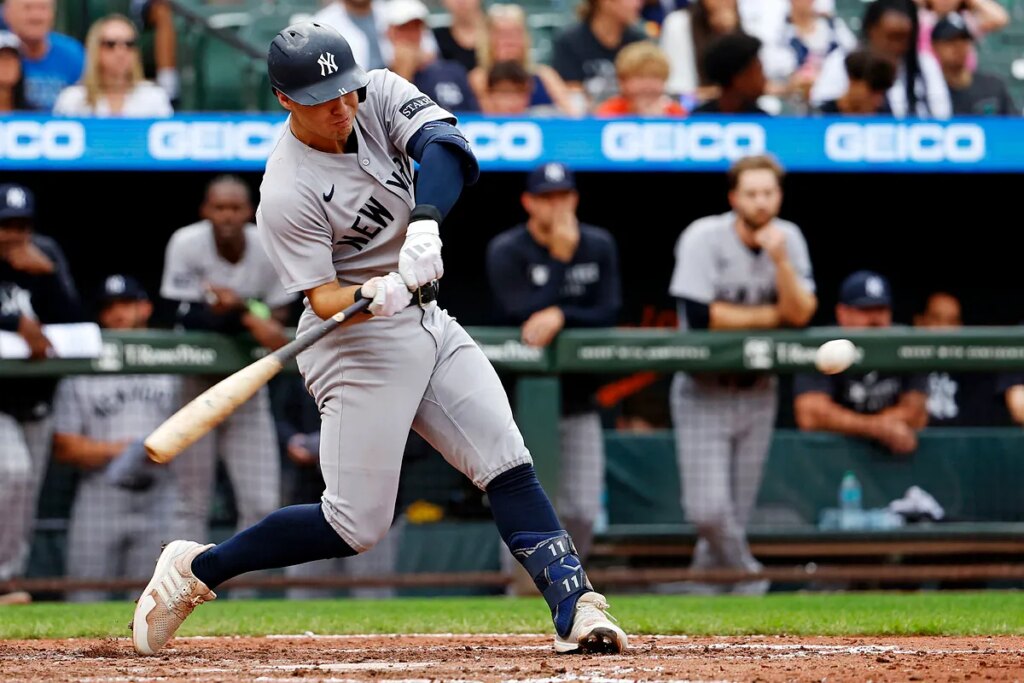The offseason hype is long gone for Anthony Volpe. Once spoken of as a potential middle-of-the-order star and defensive anchor for the New York Yankees, is now bearing the harsh glare of criticism as “worst player of 2025.”
Heavy.com has declared his performance the worst among Yankees with at least 100 appearances, citing a career low batting average of .211 and a .670 OPS.
For a player once lauded for his high ceiling, the fall has been steep, and Volpe’s struggles haven’t taken long to attract attention.
Volpe’s offensive numbers are underwhelming; his bat, once a selling point, now raises doubts. His defense, long considered a saving grace, is no longer reliably strong. The combination is eroding his value to a franchise that expected him to become a cornerstone.
Fans and analysts alike have not held back. One lamented Volpe’s scoring droughts and swing-and-miss rate; others have pointed to his inability to handle fastballs high in the zone.
A stretch where he went 1 for 37 with zero walks drew fresh scrutiny, with many asking where his consistency has gone. But some of the sharpest critiques come not from stat sheets, but from people who know Volpe’s game and history.
The mere presence of a utility infielder like Jose Caballero as a potential replacement signals how wobbly Volpe’s grip on the shortstop role has become.
Injuries, regression, and mounting pressure
Volpe hasn’t escaped the physical toll of the season either. Reports revealed that he’s been playing through a partial labrum tear in his left shoulder since May.
The injury apparently began with a dive in the field that caused a “pop.” A cortisone shot has followed to manage the swelling, but the damage seems to have affected both his swing and his range in the field.
Since August 2, Volpe’s batting average has cratered, falling to just .145. By the standards of the Bronx, that kind of slump is untenable. This injury context helps explain some of his decline, but it also intensifies the questions about Volpe’s long-term viability.
He leads the league in errors for shortstops, and his defensive metrics are no longer covering for his offense. Advanced stats suggest he is well below league average in both fielding and hitting value. At this point, it’s no longer just about flashes of brilliance; it’s about durability, consistency, and returning to form.
Manager Aaron Boone has defended Volpe publicly, even when benching him for the first time in 46 straight games. Boone describes the moves as day-to-day, positioning them as “resets” rather than signals of permanent demotion.
But as the Yankees push toward postseason contention, every lineup decision carries weight. Caballero, acquired at the trade deadline, now offers shortstop depth and increases potential internal pressure.
How has Volpe reacted to criticism?
Volpe has owned up to his struggles: “As a competitor and someone who takes pride being out there every day, you take it on the chin and look at the positives. It’s all on me,” he said.
That accountability is notable, but in New York, good intentions don’t erase poor results and the Yankees’ investment in Volpe has been considerable. He’s young, talented, and formerly full of promise. But the 2025 season has tested that promise like never before.
If he doesn’t turn things around soon, this could be remembered as the year Volpe’s potential stalled rather than launched.
Next spring, arbitration looms, and so does a decision point for the Yankees. The question remains whether they will extend faith in Volpe and gamble on his reclamation, or move on and look at alternatives.
Either way, this season will be viewed as the turning point-for Volpe, for the Yankees, and for the relationship between hype and results in New York.
Read the full article here

